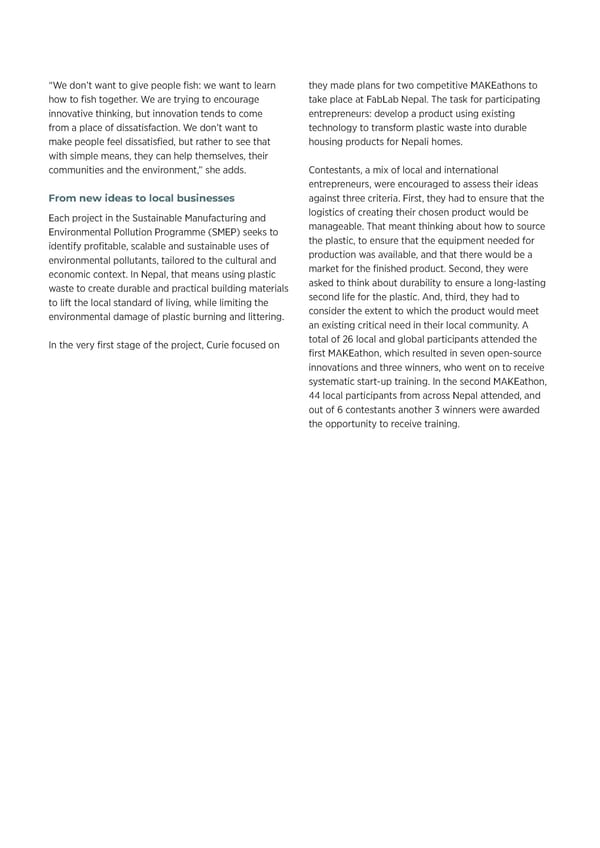SUSTAINABILITY SPOTLIGHT | 44 “We don’t want to give people 昀椀sh: we want to learn they made plans for two competitive MAKEathons to how to 昀椀sh together. We are trying to encourage take place at FabLab Nepal. The task for participating innovative thinking, but innovation tends to come entrepreneurs: develop a product using existing from a place of dissatisfaction. We don’t want to technology to transform plastic waste into durable make people feel dissatis昀椀ed, but rather to see that housing products for Nepali homes. with simple means, they can help themselves, their communities and the environment,” she adds. Contestants, a mix of local and international entrepreneurs, were encouraged to assess their ideas From new ideas to local businesses against three criteria. First, they had to ensure that the Each project in the Sustainable Manufacturing and logistics of creating their chosen product would be Environmental Pollution Programme (SMEP) seeks to manageable. That meant thinking about how to source identify pro昀椀table, scalable and sustainable uses of the plastic, to ensure that the equipment needed for environmental pollutants, tailored to the cultural and production was available, and that there would be a economic context. In Nepal, that means using plastic market for the 昀椀nished product. Second, they were waste to create durable and practical building materials asked to think about durability to ensure a long-lasting to lift the local standard of living, while limiting the second life for the plastic. And, third, they had to environmental damage of plastic burning and littering. consider the extent to which the product would meet an existing critical need in their local community. A In the very 昀椀rst stage of the project, Curie focused on total of 26 local and global participants attended the building her network of collaborators and was glad 昀椀rst MAKEathon, which resulted in seven open-source to 昀椀nd a lot of interest in participating. Once it was innovations and three winners, who went on to receive established that the project had potential, the team had systematic start-up training. In the second MAKEathon, plastic-processing machines imported and installed, and 44 local participants from across Nepal attended, and out of 6 contestants another 3 winners were awarded the opportunity to receive training. Innovation tools, expert talks, mentoring and prototyping support were provided to the MAKEathon at FabLab Nepal. Copyright 2024 © Curie Park.
 Sustainability Spotlight Magazine Page 43 Page 45
Sustainability Spotlight Magazine Page 43 Page 45